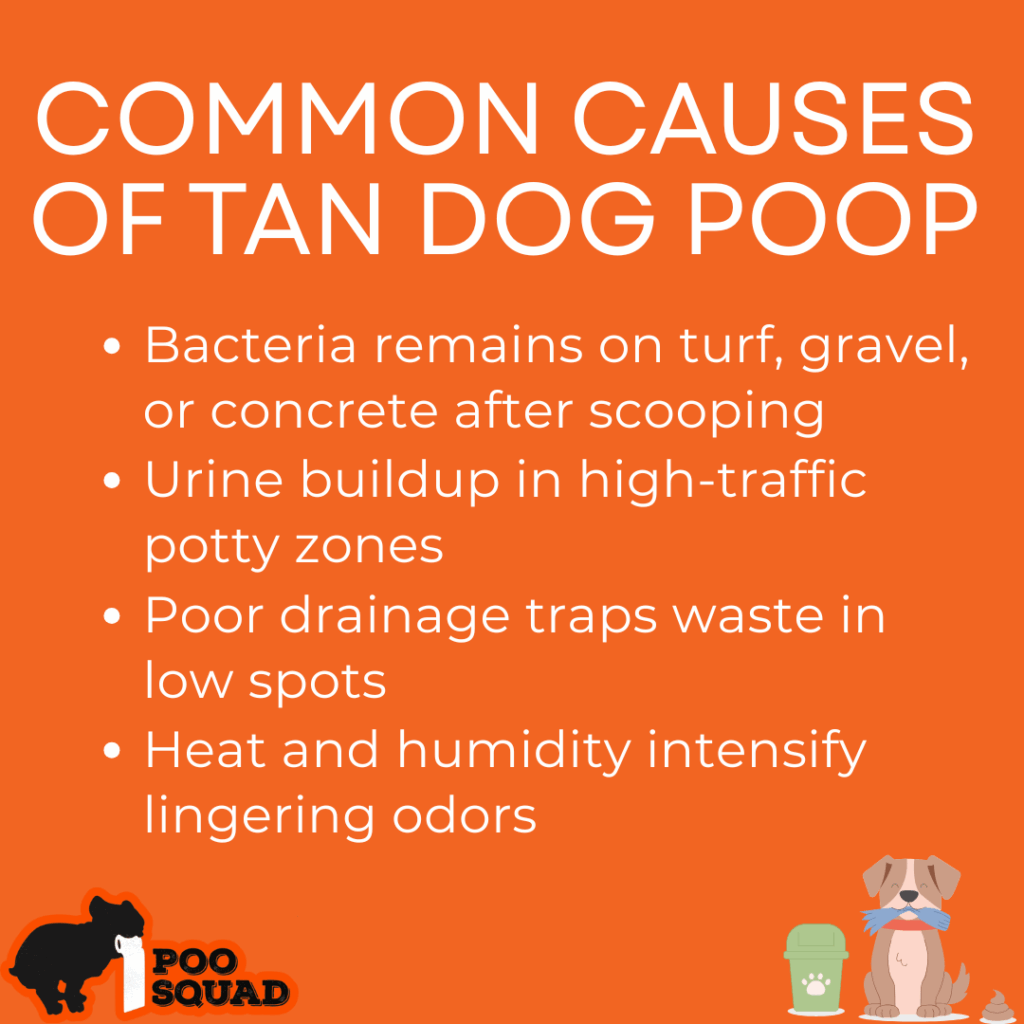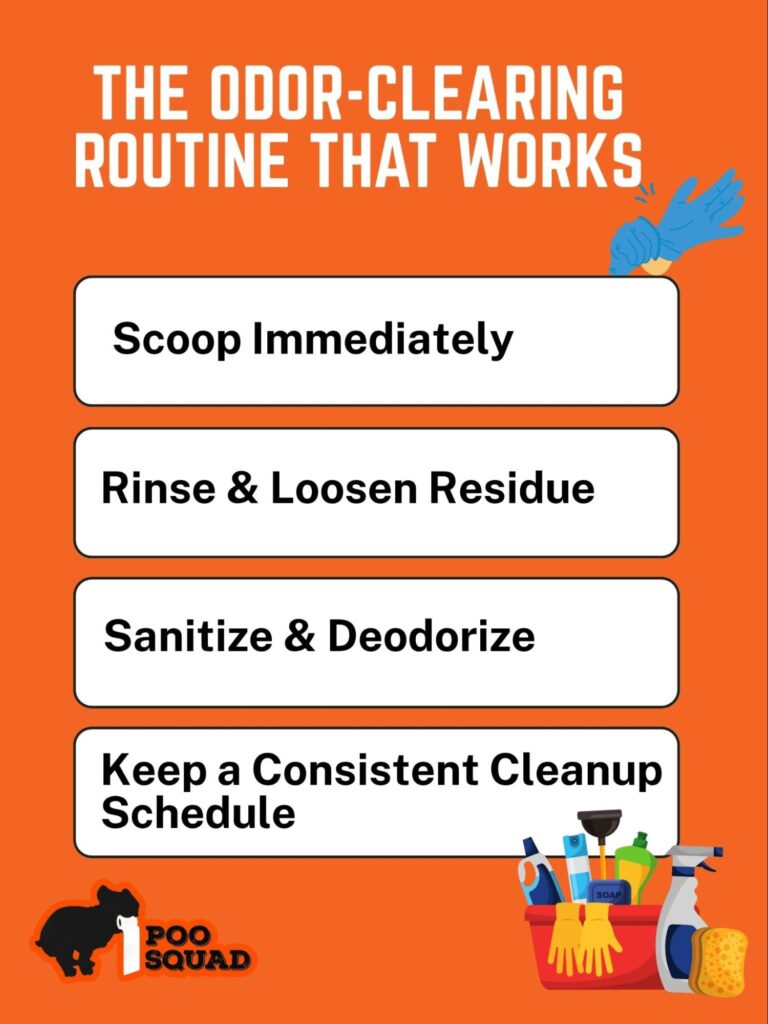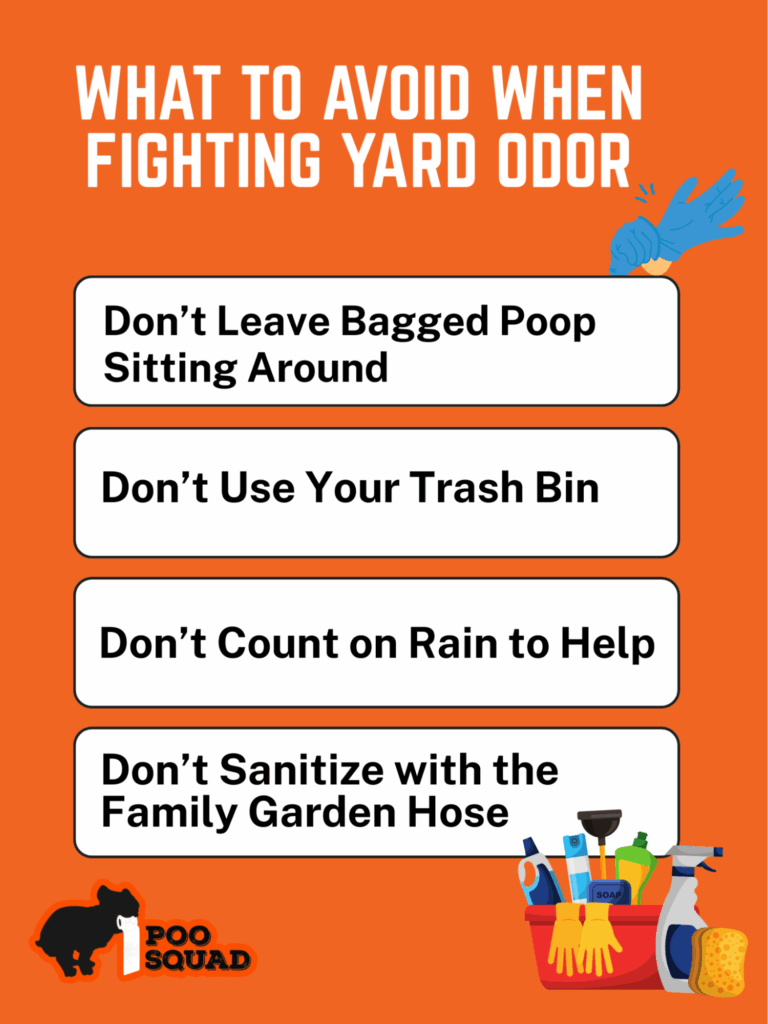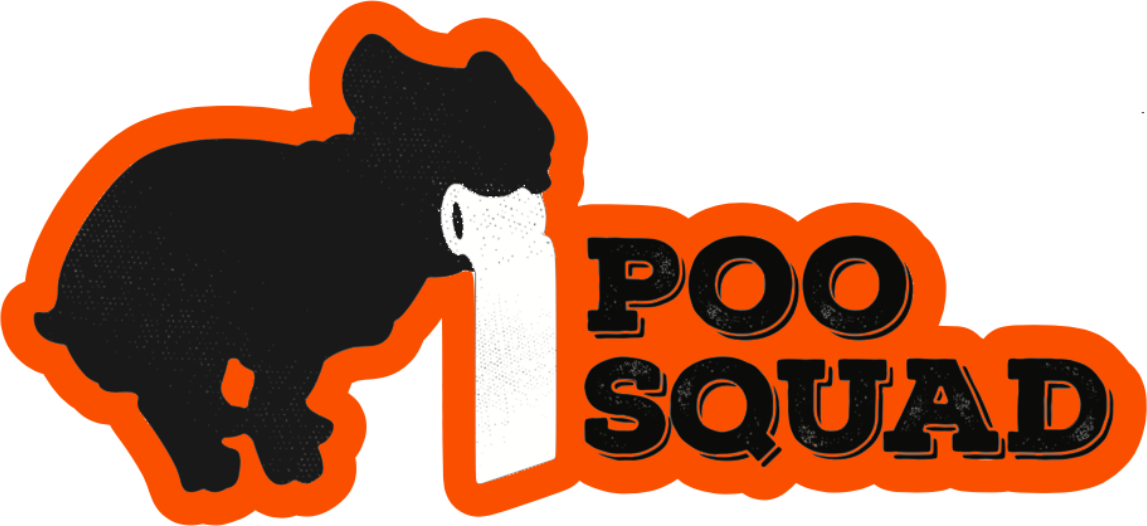To eliminate dog poop odor from your yard, you’ll need more than a quick cleanup. Scooping alone won’t cut it; bacteria left behind on turf, gravel, and patios continue to smell long after the waste is gone. A complete odor-control routine tackles the source, not just the symptoms.
Here’s the step-by-step routine we recommend:
- Scoop promptly and consistently: Old waste smells stronger and spreads bacteria quickly, especially in warm or humid weather.
- Rinse targeted potty zones: Use a hose to flush out residue from turf, gravel, or concrete after scooping.
- Sanitize with an enzyme cleaner: Apply a pet-safe enzymatic spray to break down lingering organic material and neutralize odor.
- Deodorize naturally: Lightly sprinkle baking soda or use a vinegar-water mix (avoid vinegar on grass) to freshen the area.
- Improve drainage where needed: Soggy, low-lying zones trap bacteria and magnify odors over time; keep them dry and graded.
Whether you’re gearing up for a summer hangout, recovering from skipped scooping, or just want your yard to smell like, well, a yard, this process gets it done.
Keep reading. The stink stops here.
Why Your Yard Still Smells Like Dog Poop (Even After Cleanup)

You scooped the yard, tossed the bag, and figured the stink would go with it. But somehow the smell still hangs in the air, like a bad decision that won’t leave. Here’s why.
Dog poop isn’t just a surface problem. Even after the pile’s gone, odor-causing bacteria stay behind and keep doing what they do best: smelling terrible. This stuff clings to porous surfaces, gravel, artificial turf, even wooden decks, so unless you treat the area, it keeps coming back for an encore.
It’s not just the poop, either. Urine seeps into the ground, especially in high-traffic spots like potty corners or dog runs. Add a few days of heat and humidity, and you’ve got a backyard with the scent profile of a barn.
And let’s not forget diet. Dogs who eat rich foods, table scraps, or high-protein kibble can leave behind some seriously pungent business. If your dog’s waste clears the patio, it might be time to revisit what’s in their bowl.
Why things still smell even after a good scoop session, or questioned whether cleanup services tackle odor or just the poop, it’s usually because no one’s treating the root problem. That’s why we always recommend following cleanup with an actual sanitation routine. If you’re ready to knock out both in one go, check out this yard deodorizing add-on we offer.
The Odor-Clearing Routine That Actually Works
If you’re still playing backyard roulette with that smell, it’s time to switch up the routine. Here’s the four-step playbook that clears the air, for real.

Step 1: Scoop Immediately
The longer waste sits, the worse it smells. Old piles become odor factories, especially when the weather turns warm and wet. If you’ve got more than one dog, scooping daily might be the only way to stay ahead.
Doing it yourself?
Grab a pair of gloves and a reliable scoop. Want someone else to deal with it? Our routes run weekly or biweekly, and yes, we double-check the gate and send you a photo after every visit.
Step 2: Rinse & Loosen Residue
After scooping, spray the area down with a garden hose. This helps loosen residue and dilutes lingering bacteria. Just skip the pressure washer until the poop’s picked up, nothing spreads contamination faster than high-speed splatter.
Step 3: Sanitize
Surface still smells? That’s when it’s time to sanitize. For patios, artificial turf, or concrete, use an enzyme-based cleaner made to break down organic waste. If you’re into DIY, a 1:1 mix of white vinegar and water works well on hard surfaces.
Bleach might seem like a strong option, but don’t use it outdoors; it’s unsafe for pets and can mess with your soil. Someone online asked if bleach was okay on concrete, but honestly, there are better and safer choices.
Step 4: Deodorize
Now that the area’s clean, finish with a deodorizer. Baking soda works great on lawns and turf; just sprinkle it lightly and hose it in. For a homemade spray, combine water, vinegar, and a few drops of mild, pet-safe dish soap.
Prefer store-bought?
Sprays like Angry Orange or enzyme formulas made for kennels can help. Activated charcoal pouches are another solid option, especially near decks or dog runs, though they’ll need to be replaced over time.
Want this whole routine handled for you?
Our sanitation and deodorizing service includes every one of these steps, plus a few we’ve picked up from years in the field.
Natural Remedies (That Actually Work)
Not every backyard fix has to come from a bottle with a warning label. Some of the most effective ways to fight dog poop odor are already in your kitchen, or growing in your garden.
Baking Soda: The Backyard MVP
Baking soda is a go-to for a reason. It neutralizes the acidic compounds in waste and is gentle on both pets and grass. Just sprinkle it over problem areas, give it a light rinse, and let it work its magic. No weird residue, no damage to your lawn.
Vinegar: Great on Patios, Tricky on Grass
White vinegar does a solid job of breaking down odor on hard surfaces like decks, patios, and concrete pads. Just mix it 1:1 with water in a spray bottle. But be careful with lawns, too much vinegar can burn grass and leave brown spots where green should be.
Plants That Do More Than Look Pretty
Some herbs do double duty: they smell great and help mask backyard funk. If you’ve got space near the fence line or around your dog’s favorite bathroom zone, consider planting mint, rosemary, or lavender. They’re not magic, but they can nudge the air in the right direction.
A Word on Oils
There’s been a lot of talk about using essential oils outdoors to mask dog odors. Technically, yes, some people do this. But many oils, like tea tree, eucalyptus, and cinnamon, can be dangerous to dogs. Unless you’re sure what you’re doing, it’s better to skip it or stick to products specifically made for use around pets.
Enzyme Cleaners That Don’t Just Mask
If you want a natural cleaner that breaks down the source of the smell, not just covers it up, bio-enzymatic formulas are the way to go. These are the same kinds of solutions we apply when we handle sanitation and deodorizing during yard service. You can check that option out right here if you’d rather let someone else handle the science.
Natural doesn’t mean ineffective, just smarter. With the right mix of kitchen staples and safe cleaners, you can freshen up your yard without leaving it smelling like a chemical spill.
What to Avoid When Fighting Yard Odor

Not all cleanup strategies are created equal. A few common ones can make things worse. Here’s what to skip if you’re trying to keep your yard from smelling like a dog park on a hot day.
Don’t Leave Bagged Poop Sitting Around
Tossing scooped poop into a bag and leaving it in the yard for “later” might seem like a temporary win, but it’s just a ticking stink bomb. Even tied-off bags leak odor, especially in summer. Always dispose of it properly, and don’t stash it near patios or walkways.
Don’t Use Your Trash Bin
It’s tempting to drop dog waste into your regular trash can, but that’s how you end up with a garage that smells like a kennel. Bags break. Odors linger. If you’re doing your cleanup, find a separate container or disposal service that doesn’t bring the smell back inside. For reference, when we handle waste removal, we never leave it behind or stash it in a customer’s bin.
Don’t Count on Rain to Help
Rain might rinse things off, but it doesn’t clean. Water can spread bacteria deeper into the yard or pool it in low spots, making the odor worse. Ever notice how your yard smells stronger after a downpour? That’s why.
Don’t Sanitize with the Family Garden Hose
Using your garden hose to spray down a smelly corner might seem practical, until you remember it’s the same one your kids use on the trampoline or you use to water your tomatoes. Keep a separate hose if you plan to clean up regularly, or leave the sanitation step to someone with dedicated gear.
Humidity, moisture, and half-done cleanup routines all make odor worse. If you’ve been rinsing and wondering why the smell still won’t go away, it’s probably because the wrong approach just spread the problem around. A proper odor removal routine, starting with a scoop and ending with the right kind of sanitation, is always the better move. And yes, you can skip the trial-and-error and book your first visit.
Deep Clean Add-Ons That Make a Big Difference
Some areas of your yard need more than a quick scoop and spray. If you’ve got surfaces that hold on to odor, or spots where your dog likes to go again and again, it might be time for a deeper clean. Here’s where that extra effort pays off big.
Deck and Patio Sanitizing
Planning a cookout but worried the smell’s going to crash the party? Poop odor clings to wood and concrete long after it’s been rinsed. A good enzymatic cleaner designed for hard surfaces can reset your patio and make that outdoor space feel like an actual hangout zone again.
Kennel & Dog Run Deodorizing
These areas are like odor magnets. Small, enclosed, and high-traffic, perfect conditions for stink to settle in. Regular cleaning helps, but targeted deodorizing and sanitation keep things fresh and safe, especially if you’ve got older dogs or pets recovering from illness.
Artificial Turf
Fake grass looks great until it traps real odors. Turf tends to hold waste residue and moisture, which leads to long-term buildup if you’re not treating it with the right stuff. Turf-specific enzyme sprays and a turf rake or scrub can make a world of difference. Skip the bleach, it won’t help and might damage the material.
One-and-Done Cleanups That Stick
If all of that sounds like a Saturday you don’t want, we’ve got a full-service sanitation and deodorizing treatment that includes all of the above. Whether it’s a one-time deep clean or part of your ongoing yard service, you can see what’s included and schedule a visit.
Odor has a way of creeping back when it’s ignored. A few targeted add-ons now can keep your whole yard fresher, longer, and maybe even make your next backyard hangout a little more nose-friendly.
Preventing Future Odors
Once your yard smells clean, the goal is to keep it that way. Prevention doesn’t have to be complicated; it just takes a little planning and consistency. Here’s how to stay ahead of the stink.
Create a “Poop Zone”
Dogs love routine, and that works in your favor. Train them to use a specific area of the yard for bathroom breaks. Smaller mess radius means faster cleanup, and fewer surprises by the garden hose. Once the zone is set, it’s easier to monitor, clean, and deodorize without chasing smells across the yard.
Choose the Right Surface
Grass might be soft on paws, but it holds onto moisture and waste residue. Consider laying down mulch, pea gravel, or artificial turf in your dog’s bathroom area. These surfaces drain better, clean easier, and don’t develop that swampy smell after a few rainy days.
Keep a Consistent Cleanup Schedule
Summer heat accelerates odor, and missing just a few days can undo all your hard work. Whether you’re doing it yourself or outsourcing it, the trick is consistency. A reliable weekly clean with an occasional deodorizing touch-up will keep things under control, no spraying forever, no scrambling before guests arrive.
Improve Drainage Where It Counts
Low spots in your yard collect water, dog waste runoff, and bacteria, basically a recipe for stink. Smoothing out those areas, or using gravel to improve drainage, helps keep your yard drier and less odor-prone.
And if you’re in “emergency cleanup before the in-laws arrive” mode, our deodorizing add-on is one of the fastest fixes for lingering pet smells. You can schedule it as part of your next visit.
Long-term odor control isn’t about working harder; it’s about setting your yard up to do the work for you. One good habit, one smart zone, and one solid plan is all it takes.
Smart Odor Hacks from the Field
Some lessons you learn the hard way, like finding out that tall grass and dog poop make the worst kind of combo. After thousands of yards and just as many “presents,” here are the real-world tricks that make a difference.
Short Grass, Less Stink
Tall grass traps moisture, hides old waste, and amplifies odor. Keeping your yard trimmed and scooping early cuts down the smell dramatically. Rock beds are even worse, poop gets wedged between stones and turns into a mini compost pile.
The Triple Gate Check (and Why It Matters)
Cross-contamination is real. That’s why the tools and shoes used during service are sanitized between every stop, and gates are checked three times before leaving. It’s not just about doing the job, it’s about protecting every dog on the route.
Dog Poop = Health Check
Unusual odor or color changes in waste can signal problems. That’s why a poop report gets sent if anything looks off. Smell can be your first clue that something’s wrong with your pup; better to catch it early than guess later.
No Trash, No Borrowed Hoses
Here’s something customers appreciate more than they expect: we never toss waste in your bins or grab your hose to clean up. Using your tools for sanitation is a fast way to spread bacteria, and a slower way to ruin your weekend.
Myth: Dog Poop is Fertilizer
Let’s shut this one down for good. Dog waste isn’t good for your lawn. It’s full of bacteria, parasites, and high nitrogen levels that can burn grass and contaminate soil. Rain doesn’t wash it away; it spreads it out. Daily storms don’t cancel the need to clean. If anything, they make treatment more important.
Safe Sprays Only
All cleaners and deodorizers used in the field are selected to be safe around dogs and kids. No bleach. No harsh residues. Just odor-neutralizing solutions that get the job done without adding new problems.
Think of this section as the things we wish every customer knew before they fired up the hose or bought the strongest-smelling spray they could find. And if you’re ever unsure what’s safe to use, or you’d rather just delegate the mess entirely, you can start with a full cleanup and odor service.
When to Call in the Pros
Sometimes, the smell wins. And that’s okay.
If you’re working with a large yard, artificial turf, or a recurring stink that keeps coming back no matter what you try, it might be time to bring in backup. Professional services don’t just scoop, they sanitize, deodorize, and leave no trace behind.
The right tech doesn’t just show up; they’re easy to spot in bright orange, arrive in branded trucks, and carry verified badges you can check with a tap. That kind of peace of mind matters when someone’s walking into your yard with tools meant for cleanup.
Whether you’re prepping for a backyard gathering, tired of wrestling with turf, or just done pretending the smell “isn’t that bad,” our sanitation and deodorizing treatment gets it done in one shot. You can book your first visit or get matched with a local crew.
No pressure. Just a cleaner yard and your weekend back.
